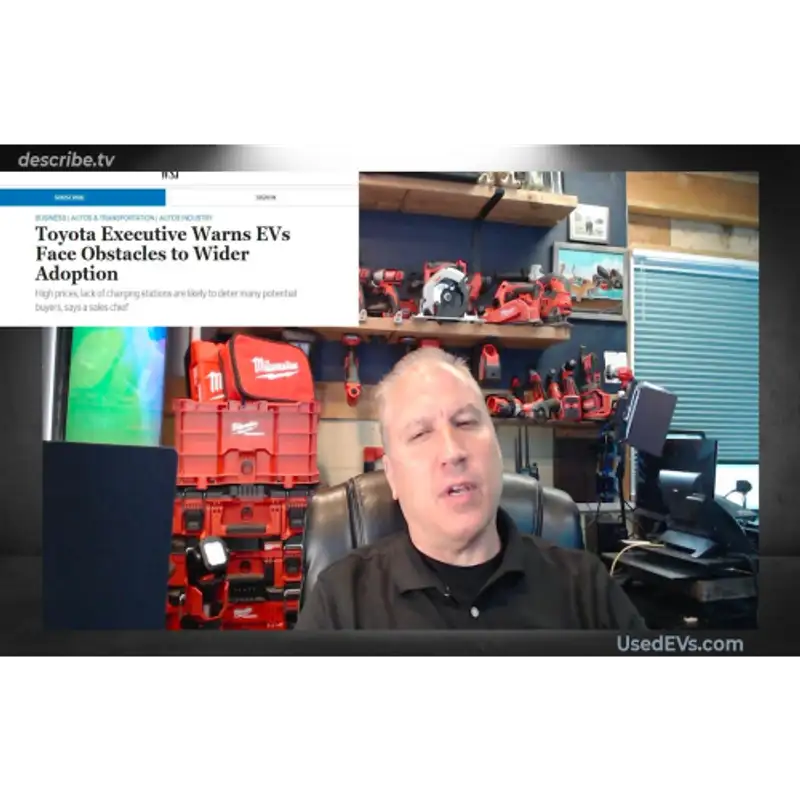Racing Into the Future: Is the EV Transition Moving Too Fast?
Download MP3Okay, electric vehicles are on the rise. More and more dealers and manufacturers are pushing electric vehicles as opposed to gasoline vehicles or internal combustion vehicles. But is there a serious obstacle to prevent the full widespread adoption of these vehicles? Obviously, we've heard about the charging station problem, where maybe there aren't enough places for these vehicles to plug in and recharge. We've heard a lot about the pricing of these vehicles being 15 or 20 percent higher than a standard gasoline vehicle.
Well, maybe there's something else behind the scenes that might even be a bigger problem. According to a Wall Street Journal article, a Toyota executive warns that electric vehicles face obstacles to wider adoption. Sure, high prices and charging stations are a problem, but besides that, there may be a problem with actually building these cars in the first place. The place with the most lithium is blowing the electric car revolution. A California-sized piece of South America is stifling production of the metal when battery makers need it the most.
What's going on here? Well, in Chile, there's a huge mine of lithium, which is more than half of the known deposits of the metal, which is the key component of building the EV battery, the core component of an electric vehicle. So, more than half of the lithium is in Chile. There's a Chinese company called BYD that has contracted to mine this lithium elemental material. Never mind the fact that it's a Chinese company that is mining this—maybe that could create some supply or availability issues. But this company won the contract to mine the lithium.
What is going on, though, is the country itself of Chile is having a pushback—a backlash—against this mining operation. The residents of the country took to the streets, demanding that the contract be cancelled because it's going to affect the environment, water supplies, and other issues. The Supreme Court of the country threw out the contract, saying the government failed to consult with the local residents first. According to spokespeople in the country, they want to produce more lithium, meaning their contract, but they're the ones who pay the price—meaning the local residents.
According to an expert at the U.S. Geological Survey (USGS), all the major car makers are completely on board with electric vehicles, but the lithium may not be enough. Let that sink in—there may not be enough lithium.
Isn't the whole reason to switch to electric vehicles to get away from fossil fuels and help the environment? Many years ago, I can remember in the 70s and 80s, there was a very serious concern that we were going to run out of oil to make gasoline for cars. That was the reason that part of the environmental push to cut back on oil and fossil fuel usage and production started, because they thought we were going to run out. Well, it turns out we weren't running out. They did other methods of extraction, and so the supply actually fixed itself. But then there's the environmental problem—fossil fuel usage and combustion is part of the idea that it contributes to environmental degradation. Whether that's true or not is a whole different story, but that's the reason for going to electric vehicles.
Well, the question is: Is mining this lithium any better for the environment than oil production? And that doesn't even take into account whether or not the electricity generation has any environmental impact. Leaving all that aside, the big question is, can we build enough electric vehicles? All the car makers are completely on board, but the lithium may not be enough.
Brian Giscoola, a lithium expert at the USGS (a government agency, by the way), and a biologist in the country, said that the mining has caused nearby lagoons to dry up, and the damage is irreversible. That's the lithium mining in Chile. So, what does that mean for the marketplace?
Well, the Executive Vice President for Toyota says that you can talk all you want about EVs, but the marketplace isn't mature enough. What does that mean? Well, the high sticker prices and poor charging infrastructure will keep customers from widely embracing it. But he also talked about the rising material costs for lithium and cobalt. But more importantly, he says, "I don't think the market is ready for what the rhetoric is saying." And this comes from Toyota, which really kind of spearheaded hybrid and electric vehicles. Think about the Toyota Prius—this was even before Tesla. The Prius was the first real hybrid mass-market vehicle, and their Executive Vice President is saying that it could be a problem.
Let us know what you think in the comments: Are EVs a thing? Is it going to take longer than they anticipate? And in the meantime, what's that going to do for the car market when the manufacturers are in between gas and electric? They don't want to build more gas vehicles because they know electric's coming, but we're not ready for electric. Is there going to be a period in between where there’s not going to be enough cars, and the car market’s going to get even worse in terms of availability? Will no one have a car to drive, and the market can't keep up?

